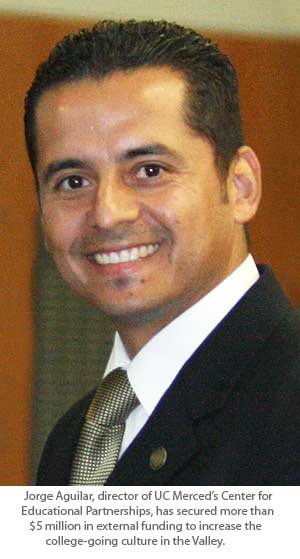

State funding for university outreach programs was already receding from its all-time high in 1998 when UC Merced established its
Center for Educational Partnershipsin 2002.
The university knew it would need outside help to accomplish its goal: to forge partnerships with schools from throughout the area to help low-income and first-generation college students navigate through the maze of higher education. At the moment, CEP’s services stretch from Kern to Stanislaus counties.
We knew early on that if we only relied on state funding, we could never scale our work to a point where we would impact our entire service region, said
Jorge Aguilar, founding director of the CEP.We immediately began to build an infrastructure within the center to receive additional funding, and now the state funds only about 50 percent of our budget.
Largely through Aguilar’s hard work, the CEP has received more than $5 million in external funding to supplement what it receives from the state. Some of it comes from the federal and state departments of education, and some of it comes in the form of grants from local businesses like Pacific Gas and Electric Co. and Paramount Farming Co.
That extra money has allowed the center to hire more staff and create new programs to help local students get into college and to teach parents how to help them pay for it. The center’s most recent grant, a four-year, $1 million commitment from the U.S. Department of Education, will fund the new Upward Bound program. This program will provide a six-week summer residency for 50 Fresno high school students to learn about college life.
The Upward Bound program highlights one of the aspects of the CEP that makes Aguilar most proud. Because the residency takes place at Fresno Pacific University, there is no implication that the CEP is purely a UC Merced recruitment tool.
Our chancellors have been very respectful in arguing that the center’s role is to work with first-generation, low-income students to prepare them to become eligible for any system of higher education, Aguilar said.We don’t necessarily have the higher pressure of recruiting students to UC Merced, and I think that’s a very health policy.
Aguilar has received much of the credit for building the CEP by obtaining external funding - all while running the entire operation. But with that track record, comes the heavy burden of maintaining what has already been established.
And with statewide funding for these types of programs at less than one-fifth of what it was just a decade ago, Aguilar knows that pressure will only increase.
It’s what keeps me awake at night, he said.We have wonderful staff members, and as grants come to an end, we have to figure out how to keep them.
It’s a Catch-22. It’s the only way we can scale our programs, but on the other hand it comes with the added pressure of knowing that you’re ultimately responsible for keeping the wonderful people that have made the program successful.






